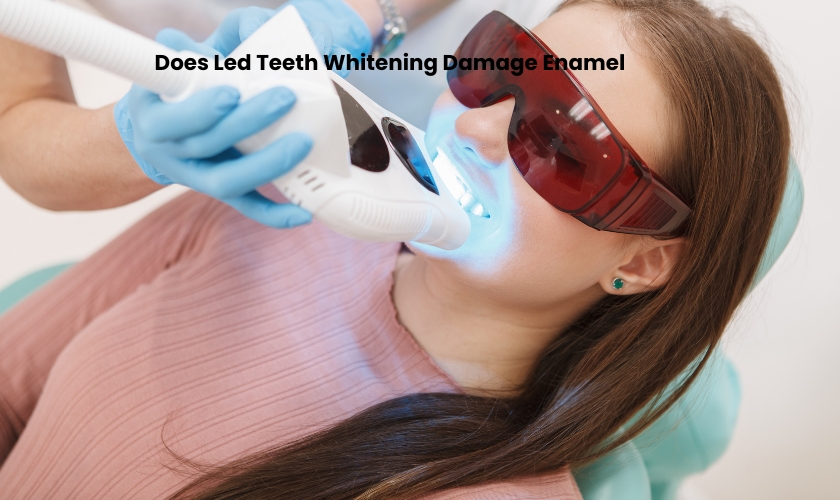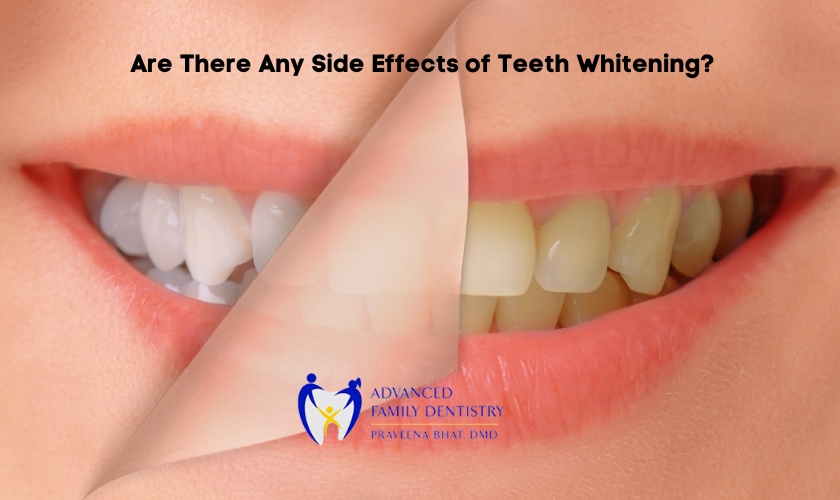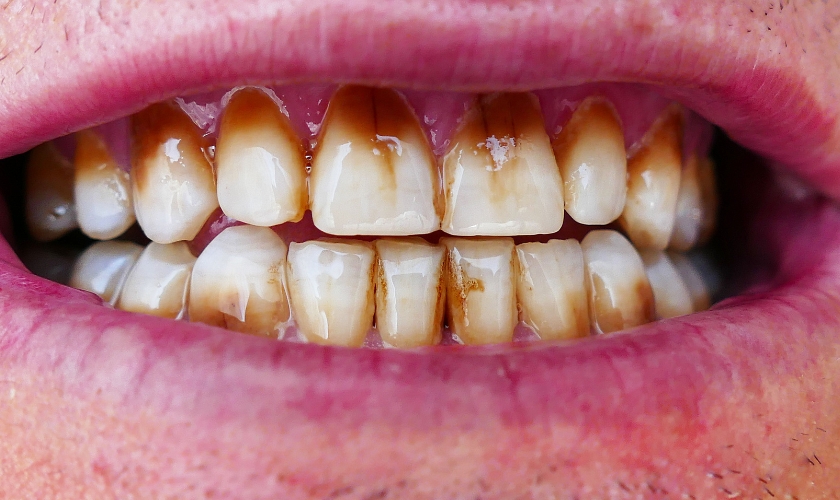Top Family, Cosmetic and Implant Center In 537 Amherst St, Nashua, NH 03063
Can Teeth Whitening Damage Veneers?
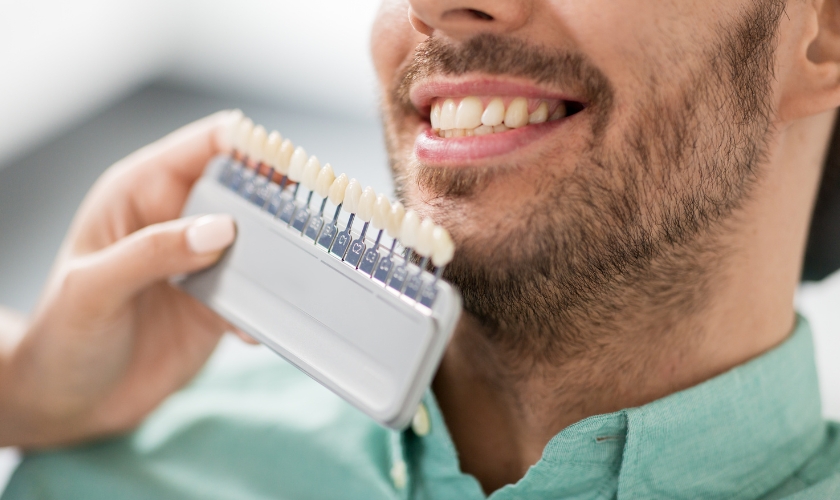
A radiant smile is often considered a key to both personal and professional confidence. However, achieving and maintaining a bright smile can be a challenge, especially if you have imperfections like discoloration or chipped teeth. Two popular solutions are teeth whitening and veneers, but their interactions and effects on each other can be confusing. This guide from Advanced Family Dentistry Nashua aims to demystify the relationship between these treatments, answer common questions, and address concerns specific to veneer wearers. Let’s delve into the question: Can teeth whitening damage veneers?
What are Veneers and How Do They Work?
Veneers are thin shells, typically made of porcelain or composite resin, meticulously crafted to conceal imperfections and enhance the appearance of teeth. These custom-designed restorations are bonded to the front surface of teeth, addressing issues such as discoloration, chips, or gaps. By providing a natural-looking and uniform smile, veneers have become a popular cosmetic dental solution.
- Discoloration: Severe staining or yellowing that traditional whitening methods cannot address.
- Chipped or cracked teeth: Veneers effectively cover up minor cracks or chips for a seamless appearance.
- Uneven tooth shape or size: Veneers can be shaped and sized to create a uniform and aesthetically pleasing smile.
- Gaps between teeth: Strategically placed veneers can close minor gaps between teeth.
The process of getting veneers typically involves three appointments:
- Consultation and preparation: During this initial visit, your dentist will discuss your goals, examine your teeth, and ensure veneers are the right solution. They might need to remove a small amount of enamel from the front of your teeth to allow for a proper fit.
- Impression and fabrication: Impressions are taken of your teeth to create custom-made veneers that match your surrounding teeth in size, shape, and color. This process can take a few weeks.
- Bonding: The final appointment involves permanently bonding the veneers to your teeth using a special dental adhesive. Your dentist will ensure a comfortable fit and a natural appearance.
Veneers are considered a durable and long-lasting cosmetic solution, typically lasting 10–15 years with proper care. However, unlike natural teeth, they are not impervious to staining or wear and tear over time.
The Differences Between Teeth Whitening and Veneers
While both teeth whitening and veneers aim to improve the aesthetics of your smile, they differ fundamentally in their purpose and application:
Teeth whitening:
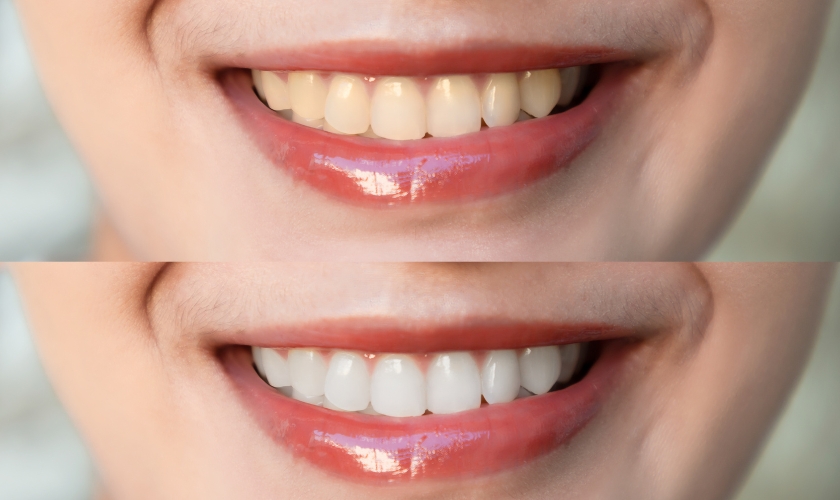
- Focus: It targets the natural color of your teeth, aiming to remove existing stains and brighten your entire smile.
- Process: Various whitening options are available, including over-the-counter strips, gels, and professional in-office treatments.
- Suitability: Suitable for individuals with naturally healthy teeth that are simply stained or discolored.
- Effectiveness: varies depending on the method and the individual’s baseline color. Whitening effects typically last for a few months to a year.
Veneers:
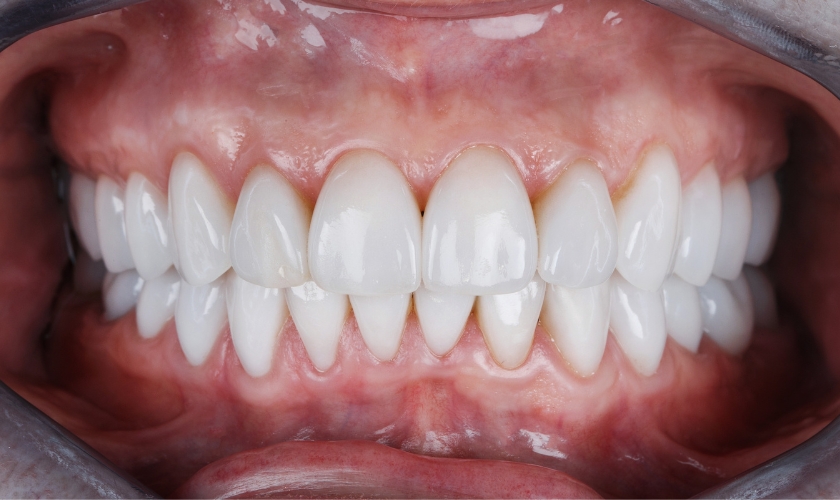
- Focus: Primarily addresses cosmetic concerns like chips, cracks, discoloration, or uneven tooth structure. They can also improve the overall shape and size of your teeth.
- Process: Requires a customized and invasive procedure involving tooth preparation and bonding of the shells.
- Suitability: Best suited for individuals with specific cosmetic concerns that cannot be addressed through whitening alone.
- Longevity: Can last 10–15 years with proper care and maintenance.
It’s important to understand that teeth whitening cannot be used on veneers themselves. They are made of non-porous materials that don’t respond to bleaching agents. Attempting to whiten veneers can potentially damage them by causing discoloration or weakening the bond between the veneer and the tooth.
Can Teeth Whitening Damage Veneers?
According to a study published in the Journal of Esthetic and Restorative Dentistry, teeth whitening agents containing hydrogen peroxide have the potential to alter the surface properties of dental materials, including porcelain veneers. The extent of the impact might vary based on factors like the concentration of the whitening agent and how long the exposure lasts.
While whitening won’t directly damage the veneers themselves, it can create an aesthetic mismatch if your surrounding teeth become whiter than the veneers. This can make the veneers appear dull or even yellowed in comparison. So, while veneers are technically safe from the whitening process, the result might not be the aesthetically pleasing smile you desire.
Tips for Maintaining Veneers:
To safeguard the longevity and luster of your veneers, consider incorporating the following maintenance tips into your oral care routine:
- Practice Good Oral Hygiene: Regular brushing and flossing are essential for maintaining the health and appearance of both natural teeth and veneers.
- Avoid Staining Substances: Limit consumption of dark-colored beverages such as coffee, tea, and red wine, which can stain both natural teeth and veneers.
- Use a Soft-Bristled Toothbrush: Opt for a soft-bristled toothbrush to prevent abrasive damage to veneers and preserve their pristine appearance.
- Attend Regular Dental Check-ups: Routine dental examinations allow your dentist to assess the condition of your veneers and address any concerns promptly.
- Wear a Night Guard: If you have a habit of grinding or clenching your teeth, wearing a night guard can help protect your veneers from damage.
Alternative Whitening Options for Veneer Wearers:
If you have veneers and desire a whiter smile, fret not! Several alternative whitening options can help you achieve your desired results without compromising your veneers.
1. Professional teeth cleaning: Regularly scheduled professional cleanings at your dentist’s office can remove surface stains and brighten your smile. This is a safe and effective way to maintain a consistent appearance without affecting your veneers.
2. Professional in-office whitening for natural teeth: Discuss the possibility of professional in-office whitening treatments for your natural teeth with your dentist. These treatments are typically stronger and more effective than over-the-counter options, allowing for a significant whitening effect without harming your veneers.
3. Veneer replacement with color matching: As veneers age, they can naturally stain or become discolored. If you desire a whiter shade overall, consider discussing veneer replacement with your dentist. They can create new veneers that match the desired whiter shade for your natural teeth.
4. Cosmetic dentistry options: Depending on your specific concerns, your dentist might recommend alternative cosmetic dentistry procedures, such as dental bonding or crowns, to address discoloration or other aesthetic issues alongside your existing veneers.
It’s crucial to remember that every individual is unique, and the best approach to teeth whitening with veneers will depend on your specific situation, goals, and dental health. Consulting with your trusted dentist at Advanced Family Dentistry Nashua is essential for receiving personalized guidance and ensuring safe and effective results.
Conclusion
Understanding the differences between teeth whitening and veneers is crucial for making informed decisions regarding your smile’s aesthetics. While teeth whitening cannot directly damage veneers, it can create an unwanted color mismatch. Consulting your dentist before attempting any whitening is essential, especially if you have veneers.
Advanced Family Dentistry Nashua is dedicated to helping you achieve a healthy and beautiful smile. Our experienced team is well-equipped to answer your questions, address your concerns, and guide you towards the most suitable treatment options, whether involving veneers, teeth whitening, or alternative approaches. Schedule an appointment today to discuss your smile goals and take the first step towards a confident and radiant smile!
FAQs:
It’s generally not recommended. These products might contain abrasive ingredients that can scratch the surface of your veneers and compromise their appearance. Always consult your dentist before using any whitening product, especially if you have veneers.
While teeth whitening treatments may not directly damage veneers, they have the potential to alter the surface properties of the restorations. It’s essential to consult with your dentist before undergoing teeth whitening if you have veneers.
With proper care and maintenance, veneers can last upwards of 10 years or more. Regular dental check-ups and good oral hygiene practices are crucial for maximizing their lifespan.
Veneers are stain-resistant but not entirely stain-proof. Certain foods and beverages, like coffee, tea, red wine, and dark berries, can stain them over time. Maintaining good oral hygiene and avoiding these staining agents can help maintain their bright appearance.
While some types of veneers can be polished in certain situations, it’s not always recommended. Consult your dentist to determine if polishing is a suitable option for your specific veneers and the potential risks involved.
Veneers can chip or break like natural teeth in cases of trauma or excessive force. Contact your dentist immediately if you experience any damage to your veneers. They can assess the situation and recommend the best course of action for repair or replacement.


